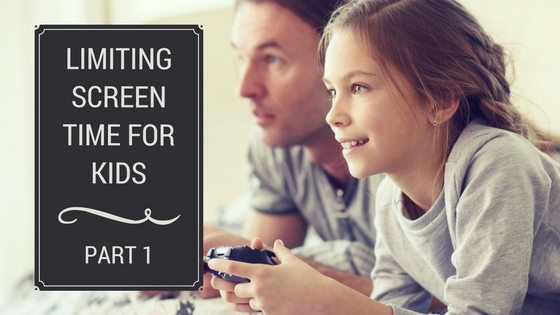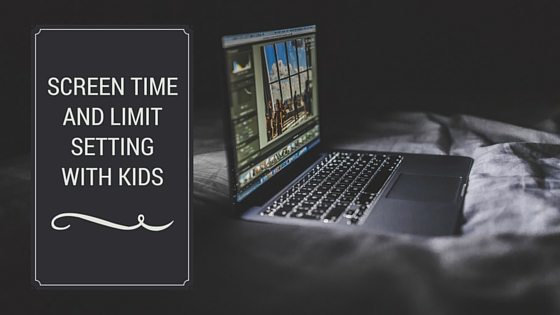Truth be told, I never love it when my children play video games. I’d much prefer them to be playing with their friends, reading a book, painting a picture, riding their bike, or eating mud (just kidding!).
It’s especially hard for our youngest (who is 11) to regulate her game playing. She often forgets to set her timer. Or she’ll say, “I’m getting off” but then she’ll get distracted and keep on doing “one more thing”.
During these summer months, we decided to do something extreme…
Unlimited video game time!
After reading all of this, you might be questioning our sanity and thinking, “Why remove the time limit on video games for a child who already has difficulty regulating her playing?”
In this two-part blog post we’ll talk about WHY we’re doing unlimited video game time–this is Part #1.
In Part #2, we’ll talk about HOW we did it and WHAT we learned from the experience.
Let’s dive in…
WHY we gave our daughter* unlimited video game time:
*We have two daughters, but the older one did not want to participate in the “unlimited video game time experiment”, so this post is only about our youngest.
PLAY
I’ve begun to shift my view of video games, ever since interviewing Dr. Peter Gray about the importance of play for the Education: Next Generation conference. He told us, for this generation of kids who doesn’t get to play outside with friends as much, that videogames are one of the rare places that kids can have complete freedom to create, interact, and do things, without interference from adults. Because of this conversation with Peter, I value video game playing more, especially the open ended, creative, socially interactive games that our kids play.
COGNITIVE BENEFITS
Dr. Peter Gray also cites some interesting research that video games help with the development of executive functioning, visual processing, attention, mental flexibility, job related skills, impulse control, memory, and attention.
SOCIAL
Our daughter lives pretty far away from her friends. It’s hard to get together for playdates. She’s made up for this a little bit through video games. She and her “real life” friends from school, are incredibly creative and social with their game play. They don’t just play the game the way it was designed. They have invented games within the video game itself. They act out books that they’ve read, visit each other’s “in game” houses, they “role play” relationships (mother-daughter-sister), make gifts for each other, they self-organize fashion shows and contests.
SELF REGULATION
Prior to this we’ve always given our kids a time limit with their video game playing. We’ve done our best to teach them to regulate their own play time by putting them in charge of setting the timer and getting off the computer. But frequently we fall into the role of “policing” their screen time. Not fun for anyone… I was reminded of the importance of helping kids self regulate their game playing when I participated in the Parenting in the Digital Age conference hosted by Susan Stiffelman. I’ve also been to two talks done by Yalda Uhls, author of Media Moms and Digital Dad, who says that children will eventually learn to regulate themselves. I began to realize that if I’m constantly managing her video game time she is not learning to regulate herself.
PARENT-CHILD RELATIONSHIP
In Martin Seligman’s book Flourish, he cites the research of Barbara Fredrickson and John Gottman. Fredrickson found that, in companies who were doing well financially, there was a 3:1 ratio of positive to negative comments made during business meetings. If the ratio dropped below that, the companies were not financially stable. Gottman–who was able to predict with a high level of accuracy couples who would stay married–found a similar ratio in marriage relationships. In his research, couples with strong and loving relationships had a 5:1 ratio of positive to negative comments.
I began to notice that so many of my interactions with our kids were about me “policing” and monitoring their video game playing. I was having more negative interactions than I wanted, it felt like our ratio was off, and it was beginning to impact our relationship. Unlimited game time shifted our ratio to more positive interactions because I didn’t have to be the “video game cop”, in fact we get to enjoy talking to them about their video games and taking a real interest in what they are doing.
BALANCE
Jason and I both grew up in families in which our parents didn’t limit our video game time. Granted, there is a difference between the games that our kids play now and the Atari games that we enjoyed in our childhood. However, when Jason and I started talking about our game playing as kids we came to the same conclusion… even though we had unlimited game time we had balance! Jason played a lot of football as a kid and had frequent practices, he rode his bike to the creek, caught fish with his bare hands, and played in a cave. I read a lot as a child, played piano, made art work, played Barbies with my sister, and cars with my brother.
When looking at our own family, we concluded that the video games weren’t the problem with our kids, the lack of balance was the problem. Then Jason and I asked ourselves: How can we help our kids to have balance in their day, with video games being just a part of what they do to entertain themselves?
So that’s why we’re experimenting with unlimited video game time.
But I’m curious about you… Do you limit your children’s videogame playing? How has it gone? Do you think that we are crazy for introducing unlimited game time?
Leave a comment below and let us know what you think.
Check out Part 2 where we’ll talk about HOW we structured unlimited video game time and WHAT we learned in the process.
Crazy experiments in parenting!
From the mad scientists,
Cecilia and Jason Hilkey










I think the best games for kids are the ones that encourage creation. Creating art, music, building, experimentation, imagination, or working collaboratively with others as a team. Games that encourage problem-solving, outside-the-box thinking, learning, and active participation. And it could be less about the game, and more about HOW your child plays it… Interestingly the game our daughter enjoyed playing the most back then, was not actually opened-ended but the way she played it was!
This is very interesting. I have seen a clear difference between our two boys. The younger one (5 yo) – we can tell him that he can watch one more video and he will happily close the iPad after that by himself (we don’t need to remind him again) and move on to other activities. For him your suggestion would certainly work very well. The older one (9yo) who has ADHD is not able to do that and will each time protest wildly when we say that the screen time is over. It does not help if we set a timer or that he has clear expectations ex-ante on how much time he can play. I cannot see how he could self-regulate even with creating a balance that you mention in the second part. For him the other activities simply don’t matter. If he watches a few hours his behavior that day also gets much worse. So, I am wondering if you have ny specific recommendations for ADHD kids. I know you mentioned that your girl has ADHD as well, but girls are different from boys and typically have other interests like drawing, etc.
Great question Andreja. Your question is a fairly complicated one. So I’m not sure that I can go into a useful amount of detail here. However we do have a class on ADHD here on our website that a lot of parents have found valuable.
https://conference.happilyfamily.com/adhd/?utm_campaign=adhd-masterclass&utm_medium=menu&utm_source=website&utm_content=classes&utm_term=website-visitor&_gl=1*ycug8i*_gcl_au*NzY0NzE0MzkyLjE3MDE3MzIxNDM.&_ga=2.54112042.344535568.1706070108-871817207.1693951095
Screen time is certainly a provocative topic. I agree with you that I’m not supporting “kids on screens all day”. That sounds like the plot to a dystopian movie! I’m interested to hear what you think after you read Part 2.
When our kids were very young, we established limits for screen time (only twice a week and Saturday mornings). This was when it mostly consisted of TV watching. Before we did that we noticed that they would be ill-tempered if they watched every day. Over a decade later their screen time has switched to more gaming. And now we’ve had to police it because of balance issues. All of our kids now have screen time every day.
Our 17-year-old has had unlimited time for 2 years. He doesn’t have balance and we don’t like it but feel he’s old enough that he has to learn for himself. Our 15-year-old has hacked our system for limiting gaming time and is incredibly unbalanced with his usage. The younger two (12 yo boy & 8 yo girl) are monitored by an online system that cuts them off. They are more balanced and have fewer or no outbursts about the limits.
This lack of balance is an ongoing problem for us. We understand that our kids interact some of the time with friends during gaming, especially the older two. However, the amount of gaming has affected their academics and attitudes negatively. None of them have screens in their rooms. I did myself in high school and was addicted to soap operas. The difference was that I had balance. I was a straight A student, involved in numerous activities, and avid reader. The three boys dislike school and their grades have fallen over the past few years. They are also not involved in school activities by choice. We opt not to force that so that they’re true to their preferences. The youngest boy only takes outside private art lessons. The middle one takes occasional art lessons. My daughter is in gymnastics. The boys all took at least 1 year of a musical instrument, but all gave it up eventually.
I’m interested to see how your experiment worked out for you. You may have had different results as your child is a girl. I agree about the negative interactions around limiting the time, but the balance issues keep us doing that with the youngest two and attempting with the 15 yo.
We’ve moved our parenting style to a more self-aware style over the past year, but screen time remains an issue.
Liz, I’m interested to hear what you think of Part 2. I can relate to a lot of what you’ve written here. The big question is: As we use connected, conscious parenting, how do we teach balance and self regulation to kids around video games? It’s a complicated answer and it varies for each family, and you are doing the most important part: questioning, reflecting, and staying engaged in the messiness of the process.
I wish there wasn’t a whole week to read the next part! We do limit screens and it is a huge, ongoing issue. I’m in the ‘less is more’ camp but my children clearly aren’t. It doesn’t sit right to think that my son with ADHD learns executive function and other real life skills by playing video games. And it also doesn’t sit right that I can leave something so highly addicting (which I believe) to the control of my 10yo sons. I don’t let them have free-reign when it comes to eating or social activities yet – why would I let them make all the decisions about screens? I see how they feel and behave when we’re on vacation and have too much sugar and late nights…I just don’t see how they can regulate their own use/needs with stimulating/addicting substances at this point. It is hard enough for adults to do this.
These are my thoughts and concerns. I look forward to reading your experience with this.
I’ll get to publishing part 2 ASAP! Interestingly, our daughter also has ADHD. I completely relate to the concerns that you’ve expressed here and I can’t wait for you to read what happened and how she has been regulating herself. It was so cool.